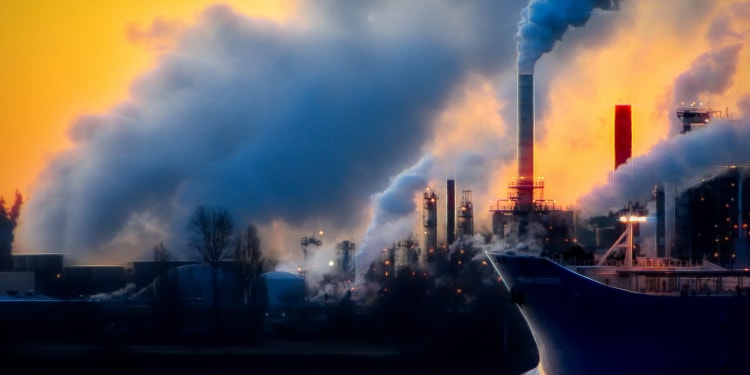The UN’s Intergovernmental Panel on Climate Change (IPCC), the world’s leading climate authority, released a scathing report on August 9, outlining how drastic measures must be taken to avoid a catastrophic and irreversible climate crisis.
In a virtual press conference streamed around the world, the IPCC presented findings from a landmark study that claims human influence on global warming is now “unequivocal”. The data presented by the UN body warned that, at current rates, key temperature limits could be broken in under a decade and sea level rises could approach 2 metres by the end of the century.
The IPCC report, the sixth to be released by the panel and the first major review of climate change science since 2013, serves as an encompassing assessment from leading experts on the climate crisis. In presenting findings that warned of imminent climate catastrophe, UN Secretary-General Antonio Guterres described the data as “code red” following the release of the report.
At a press conference on August 9, the IPCC introduced evidence to show as a “statement of fact” that humanity has had a damaging impact upon the climate crisis. The evidence is unprecedented: the IPCC used the assessments from some 14,000 scientific papers to produce its report, which was put together by 264 authors before being signed off by several dozen nations.
Included in the data was a global temperature rise of 1.1 degrees Celsius over the past decade, with each of the last 4 decades being the warmest since the late 1800s. Carbon dioxide levels in the atmosphere are the highest in at least 2 million years, and sea level rises are at their highest rates in at least 3 thousand years.
The panel outlined that current measures against CO2 emissions will not be enough, and methane production, a greenhouse gas with a “warming potential” more than 80 times that of CO2, may play a decisive role in our ability to avert the 1.5 and 2-degree Celsius global temperature rise limits agreed to at the 2015 Paris Climate Agreement.
Primarily produced through animal farming and oil and gas production, including shale gas wells and inefficient extraction methods, new measures on limiting methane output could be critical to managing the planet’s rising temperatures. Last year, methane gas emissions rose by a record amount, according to the UN environment programme.
President of the Institute for Governance and Sustainable Development and lead reviewer for the IPCC, Durwood Zaelke, claimed in a report by the Guardian that “climate change is like a marathon – we need to stay in the race. Cutting carbon dioxide will not lead to cooling in the next 10 years, and beyond that our ability to tackle climate change will be so severely compromised that we will not be able to run on. Cutting methane gives us time”.
Zaelke added that “cutting methane is the biggest opportunity to slow warming between now and 2040”.
LATEST: In a decade, global temperatures will likely blow past the level that world leaders have sought to prevent, the @IPCC_CH reports.
“The world listened, but didn’t hear,” says Inger Andersen, Executive Director of the UN Environment Programme https://t.co/TtdfNpzsR0 pic.twitter.com/qS8wDWUuWz
— Bloomberg Quicktake (@Quicktake) August 9, 2021
The IPCC report is a stark warning to the urgency of the climate crisis in the run-up to the vital COP26 conference in November, a message pushed at the press conference by the chairman of the IPCC, economist Hoesung Lee. Highlighting that “this report will serve as a timely new evidence base”, Lee added that the data should be used as “a valuable toolbox for negotiators and they consider the levels of ambition at the COP26.”
This point was echoed by UN Secretary-General Antonio Guterres, who stated after the release of the report that “if we combine forces now, we can avert climate catastrophe. But, as today’s report makes clear, there is no time for delay and no room for excuses. I count on government leaders and all stakeholders to ensure COP26 is a success.”
Related Articles: The European Union’s New Climate Plan: Why It’s an Uphill Fight | 2021 Set To Be a Busy Year For Climate Negotiations
The urgency of progress was expressed in an IPCC press release on August 9, where the body stated that “strong and sustained reductions in emissions… would limit climate change. While benefits for air quality would come quickly, it could take 20-30 years to see global temperatures stabilize, according to the IPCC Working Group 1 report”.
Valerie Masson Delmotte, a contributor to the IPCC report and head of the Working Group 1 report, said at the press conference she hoped the findings presented would “enhance climate literacy worldwide”. In being used for teaching purposes for students “so that they can learn the latest, best available knowledge,” Delmotte expressed that the report could be helpful to inform future political decision-making.
As part of this aim, the IPCC released an interactive atlas, where ‘possible climate futures’ can be predicted through the interactive use of the data presented by the authors in their report. The interactive atlas can be found here.
The #IPCC report shows that the lights are flashing red on the climate dashboard
We must come together at #COP26 and agree ambitious emission reduction targets that lead us to net zero by 2050
@IPCC_CH | #ClimateAction
https://t.co/UxmuyIAnUH— Alok Sharma (@AlokSharma_RDG) August 9, 2021
The report presented cautionary evidence to the urgency of climate change, as shown by the recent climate-driven crises such as extreme flooding in Europe and wildfires in the United States. It has become clear now that as global temperatures increase, so do the frequency and severity of extreme weather events, an assertion backed up at the press conference by Secretary of the World Meteorological Association, Petteri Taalas, who concluded that “we have begun observing extremes more often than before… affecting many weather and climate extremes in every region across the globe”.
The IPCC report’s findings give a concrete measure of the magnitude of the imminent climate catastrophe. It reports that global surface temperatures have risen faster since 1970 than any other 50-year period over the past 2,000 years and that extreme rainfall is set to intensify by 7% for each additional 1 degree celsius temperature rise.
With the COP26 underway in less than 90 days, the IPCC report serves as a compelling reminder of the grave threat that climate inaction presents. As UN Environment Programme director Inger Anderson put it in the press conference on August 9, “we can’t undo the mistakes of the past, but this generation can make things right”.
A glimmer of hope that could be quickly extinguished should the COP26 negotiations not heed the warning from IPCC.
Editor’s Note: The opinions expressed here by Impakter.com columnists are their own, not those of Impakter.com. — In the Featured Photo:Picture of Emissions Releasing into the Atmosohere. Featured Photo Credit: Chris LeBoutillier.














